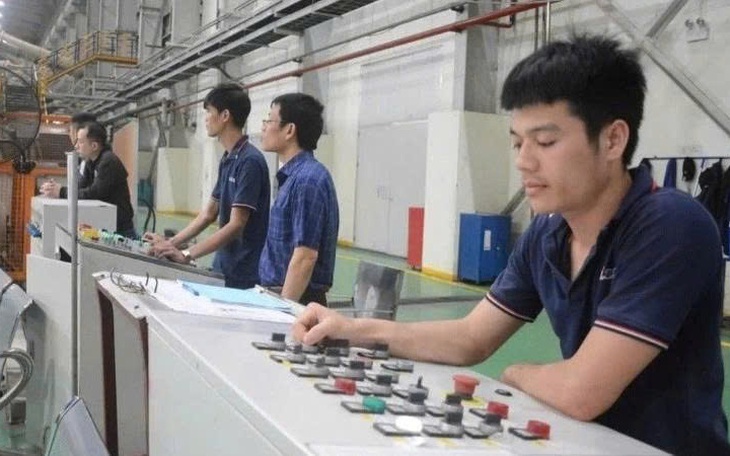
Removing bottlenecks for technological initiatives
The adoption of the Law on Science, Technology and Innovation marks a significant shift in the management and development of science and technology in Viet Nam.
One of the law’s key innovations is the establishment of a controlled testing (sandbox) mechanism, designed to provide a flexible legal framework for new models, technologies and policies to be tested within a limited scope under the close supervision of state management agencies.
The law sets out the principles, scope and duration of such controlled testing. It also clearly stipulates the principles and circumstances under which civil, administrative and criminal liability may be waived or excluded for state authorities, organisations and individuals participating in and conducting controlled trials in the event of damage or risk.
At the same time, it defines the responsibilities of licensed organisations and enterprises undertaking controlled testing, requiring them to provide information, issue risk warnings, manage data, and compensate for damage so as to safeguard the rights of participants.
The sandbox mechanism is expected to remove institutional barriers, enabling enterprises, organisations and individuals to unleash creativity and trial new technological solutions, thereby fostering socio-economic development and enhancing national competitiveness.
According to experts, the mechanism will create a favourable environment for businesses and private entities to conduct research in areas such as artificial intelligence, big data, e-commerce, financial technology and smart agriculture.
The controlled testing mechanism is a major step forward, ensuring a legal framework that both encourages innovation and protects the interests of the wider community. It will also provide businesses with the opportunity to experiment in a flexible regulatory environment, reducing the risk of prohibition or penalties due to the absence of existing regulations.
Dr Pham Kim Thu, Vice Rector of the University of Technology and Management, noted that this is also an important turning point for universities as centres of research and technological development. It opens up a safe legal space for research groups, spin-off companies and start-ups within universities to test technologies and new business models without facing excessive legal risks in the initial stages.
He expressed hope that the mechanism would unlock a series of initiatives currently “stalled” by legal barriers—such as AI applications in educational assessment, blockchain in diploma verification, or fintech services supporting student tuition and credit—all of which hold great potential but lack a clear legal framework. Other proposals include the commercialisation of research results through profit-sharing models between universities, lecturers and businesses, and the testing of digital products (EdTech, HealthTech, GovTech, etc.) in real-world settings with actual users, yet within safe boundaries.
“This mechanism will reduce legal risks for universities that dare to ‘do differently’, while also fostering an entrepreneurial spirit of innovation directly within higher education,” Dr Thu emphasised.
Sector-specific mechanisms needed
In the context of rapid advances in science and technology, the controlled testing mechanism serves as a special environment, likened to a “nursery” where ideas can be freely developed within permitted limits, thereby giving rise to breakthrough technological solutions.
However, to ensure the effective implementation of this new policy, sandbox mechanisms need to be tailored to individual sectors in order to drive start-ups and innovation.
The Ministry of Science and Technology has indicated that, based on the Law on Science, Technology and Innovation, state management bodies may develop and submit detailed regulations on controlled testing for Government approval. These should meet both regulatory requirements and the practical needs of enterprises and organisations, and must be adapted to the specific characteristics of each sector.
According to some businesses, the sandbox may serve various purposes, but most commonly it enables innovative products, services, or new mechanisms and policies to be applied in practice at an early stage.
It is important to avoid the perception that sandbox participation is mandatory, and to prevent discrimination between companies that do and do not take part. The mechanism should be regularly reviewed, adjusted and upgraded to match practical realities, and an effective dispute resolution and complaints process must also be established.
In addition, decrees and circulars providing guidance need to be promptly finalised and promulgated to create a coherent and enabling legal framework that encourages enterprises and investors to implement ideas, test new technology models, and trial innovative products in selected sectors.
From the perspective of higher education, Dr Nguyen Dai Lam, Standing Deputy Head of the Faculty of In-Service Training at Ha Noi University of Business and Technology (HUBT), proposed that controlled testing be deployed with priority given to models combining technology transfer and spin-off start-ups in areas such as digital education and artificial intelligence.
Lecturers and students, he suggested, should be allowed to test AI-powered personalised learning platforms within their institutions, alongside a flexible profit-sharing mechanism between the university and development teams.
He further stressed the need to simplify internal approval procedures, shorten response times for technological innovation proposals, and thereby enable trials to quickly align with practical demand. These areas, he noted, are not only rich in potential but also require early testing in order to refine products in a context where the current legal framework remains insufficiently flexible./.


